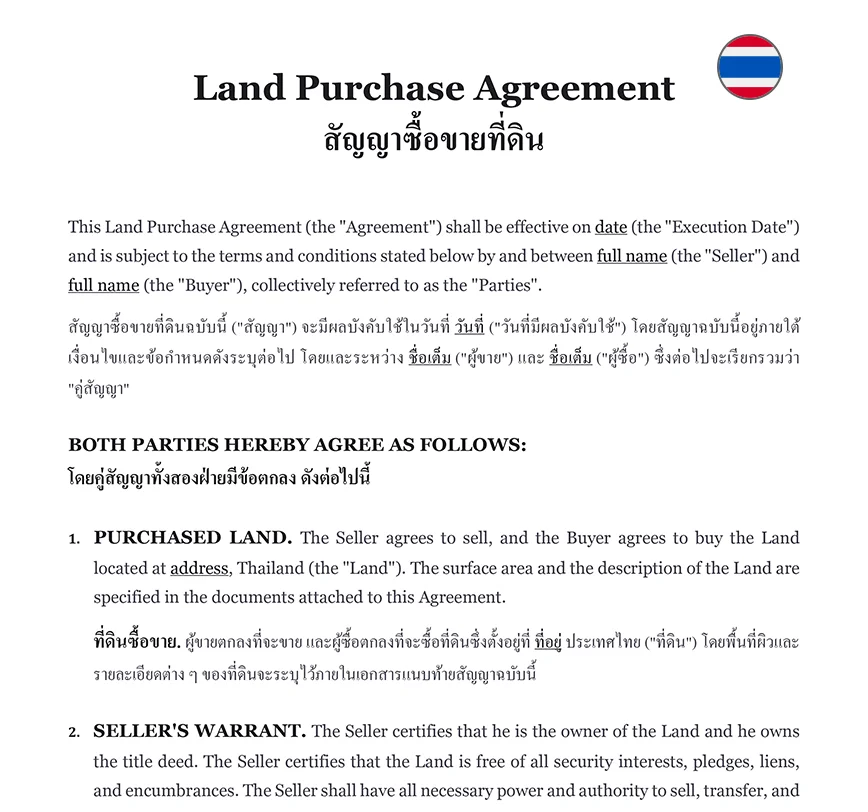How to buy land in Thailand as a foreigner remains one of the most searched investment topics, yet strict laws still make direct land ownership nearly impossible for non-Thais in 2025.
With property markets rebounding and international business owners eyeing new opportunities, understanding the precise legal pathways is crucial: a single misstep can result in loss of rights or severe financial penalties.

This guide distills the legal reality, practical alternatives, and essential documentation to help you avoid expensive errors and secure your investment safely.
Key Takeaways
- Foreigners cannot directly own land in Thailand; only leasehold or compliant Thai company structures are legal.
- Leaseholds grant up to 30 years’ use and must be registered with the Land Department to be valid.
- Thai companies must have 51% Thai ownership and real operations to avoid anti-nominee violations.
- Condos are the safest option for foreigners, within the 49% ownership quota and paid from overseas funds.
- Limited government schemes allow land purchase with THB 40M+ investment and official approval.
- Expect 6-10% extra for taxes, registration, and legal fees on top of the land price.
- Always verify Chanote titles and conduct full due diligence on ownership and documentation.
- Nominee and trust structures are illegal and risk criminal penalties and property loss.
Looking to buy, sell, or lease property in Thailand?
Our team handles registration, title searches, purchase and lease agreements and all property rights.
Table of Contents
-
Foreign Land Buying Rules in Thailand
-
Ownership Options for Foreigners
-
Alternative Property Investments
-
Costs, Taxes, and Fees for Foreign Land Buyers
-
Step-by-Step Land Buying Process
-
FAQ: Buying Land as a Foreigner
-
Conclusion
Foreign Land Buying Rules in Thailand
Laws and Restrictions for Foreign Buyers
Foreigners are not permitted to own land freehold in Thailand due to the Land Code Act, which remains strictly enforced as of 2025.
The single exception, ownership through international treaties does not apply, since no such treaties are currently in force.
Attempting to circumvent these rules, such as using nominees or false structures, can lead to severe legal consequences including forced sales and penalties.
Key legal restrictions:
- Direct land ownership is prohibited for foreigners under most circumstances
- Only approved company entities or special investment channels provide limited access
- Land use via leasehold or company structures must comply with Thai anti-nominee laws
Always consult the Land Department Thailand or Ministry of Interior for regulatory updates.
Required Documents for Land Purchase
Foreign nationals must prepare specific documents for any property purchase or registration process.
Required documents include:
- Valid passport and current visa
- Proof of funds (e.g., foreign currency transfer slip for real estate purchases)
- Evidence of residency status if applicable
- Official certified translations for non-Thai documents
All documents must be submitted to the Land Department, with certified copies as required.
Registration steps:
- Submit documentation and application at the local Land Office
- Pay applicable government fees
- Ensure all agreements (especially for leases over three years) are formally registered
Using accurate, complete paperwork is crucial for every foreign real estate transaction.
Staying informed and compliant ensures your investment journey proceeds safely and efficiently. Proper preparation and engagement with local authorities are your best assets.
Read our guide to understand Land Foreign Ownership in Thailand: Key Regulations 2025
Ownership Options for Foreigners
Leasehold Rights and Limitations
Foreigners often secure land use in Thailand via registered Leasehold Agreements, most commonly for 30 years, with possible renewal options.
Key details to know:
- Leaseholds provide land control, not ownership
- Renewal for additional 30-year periods can be included but is not legally guaranteed unless each term is registered with the Land Department
- Registration is required for leases over three years to ensure enforceability
Negotiating lease terms is crucial.
Look for:
- Clear renewal conditions
- Agreed-upon rent increases
- Transfer rights if you sell your lease
Residential and commercial leases may have different terms and use restrictions.
Using a Thai Company for Land
Forming a Thai limited company is another route, but strict rules apply:
- At least 51% of shares must be held by Thai nationals; foreigners are limited to 49%
- The company must run as a genuinely operating business, not just as a landholding entity
- Using nominee shareholders is illegal, and Thai authorities frequently audit for compliance
Company setup involves:
- Registration and ongoing reporting
- Annual accounting and tax submissions
- Regular government scrutiny to prevent shell structures
Maintenance and set-up can cost upwards of THB 50,000 for legal and administrative fees each year.
Company route mistakes can lead to costly legal consequences.
For business law updates and compliance, see Thailand Board of Investment.
Foreign land buyers in Thailand must choose between leasehold control or compliant company structures, each requiring due diligence, ongoing management, and precise legal execution.
Alternative Property Investments
Buying Condominiums as a Foreigner
Foreigners can purchase condominium units freehold, provided that foreign ownership in the building does not exceed 49% of the total sellable area.
Foreign buyers must transfer the full purchase amount from overseas and obtain a Foreign Exchange Transaction Certificate as proof.
The purchase process typically involves:
- Confirming available quota
- Sending funds in foreign currency to a Thai bank
- Registering ownership and paying official fees at the Land Department
Key benefits include:
- Direct ownership and resale rights
- Streamlined registration
- No restriction on unit use (residential or rental)
However, this does not grant land rights beyond the condo footprint.
This method allows quick entry, with most transactions completed in 30 to 45 days.
For a deeper understanding, read our guide on How to Buy Condominium Units in Thailand.
BOI and Special Investment Programs
Foreigners investing at least THB 40 million may apply to purchase up to 1 rai (about 1,600 sqm) of land for residential use, with strict Ministry of Interior approval.
Steps include:
- Making the qualifying investment in government bonds or approved assets
- Submitting required documentation and obtaining consent
- Using property solely for residence
BOI and EEC programs permit land acquisition only for operating approved businesses, subject to ongoing compliance.
These channels do not permit freehold land for personal use.
For most buyers, condos offer the most practical and secure way to own property in Thailand. High investment or business avenues have strict reviews and limited personal benefit.
Costs, Taxes and Fees for Foreign Land Buyers
Total Costs for Foreign Land Buyers
Understanding the true cost of buying land in Thailand as a foreigner starts with these main expenses:
- Land price (varies by location and land type)
- Government transfer fees: 2% of the appraised land value
- Stamp duty: 0.5% (applies if specific business tax does not)
- Specific business tax: 3.3% (may replace stamp duty in some transactions)
- Withholding tax: calculated on declared or appraised value
Legal and professional fees typically range from 1-2% of property value, including due diligence and contract drafting.
If acquiring land via a leasehold or company, add:
- Lease registration fee: 1% of total lease value
- Company setup fees, ongoing audit, and annual corporate maintenance costs
Recurring costs include annual land tax, utilities, and maintenance, all of which should be included in your budgeting.
Picture this scenario: A THB 10,000,000 land purchase can result in over THB 600,000 in taxes and fees before ongoing expenses are considered.
Tax and Charges Overview
Tax treatment can vary based on whether the buyer is an individual foreigner, a foreign-owned company, or a resident.
Key differences include:
- Companies may face corporate income tax and potential double taxation between jurisdictions
- Withholding taxes and stamp duties are calculated similarly for Thais and foreigners, but some structuring (such as nominee use) is strictly illegal and may trigger investigations
Special attention is needed if using a Thai company, as anti-nominee laws and company audits are enforced rigorously.
Consulting a qualified Thai tax advisor is recommended for any non-standard or high-value transaction.
Always include 6-10% above the land price for taxes, fees, and compliance costs, surprises are common without local expertise.
Step-by-Step Land Buying Process
Essential Steps for Safe Acquisition
Foreigners in Thailand follow a structured process when acquiring land through legal channels, such as leaseholds or company ownership. Clarity at each stage helps avoid costly mistakes.
Follow this sequential checklist:
- Search for qualified land or property with clear legal status.
- Conduct due diligence on the land and seller, confirming title deed (preferably Chanote) and surveying for encumbrances.
- Engage an independent, reputable Thai lawyer for legal review and contract drafting.
- Confirm your eligibility for the chosen ownership route (lease, company, condo, or BOI exceptions).
- Negotiate and sign preliminary contracts, submitting a deposit where required.
- Register the deal at the local Land Office, ensuring all documents are officially translated and validated.
- Collect the registered lease or title deed (as applicable).
Watch for red flags:
- Hidden encumbrances (e.g., existing mortgages, unpaid taxes)
- Non-registered or illegal structures on the land
- Attractive prices paired with non-Chanote (inferior) titles
Always verify the property’s title status, as the difference between Chanote and lesser deeds can affect long-term security.
Read our guide to understand Property Due Diligence in Thailand: Steps for Buyers.
How to Avoid Pitfalls and Ensure a Safe Transaction?
Due diligence is your strongest defense against legal and financial risks.
Implement these best practices:
- Independently check land titles at the Land Department for authenticity.
- Investigate the seller’s reputation and ownership rights.
- If using a Thai company, ensure it operates as a genuine business, not a nominee shell.
- Involve qualified, independent legal advisors and certified translators for all official documents and signatures.
A careful, evidence-based approach at every step creates confidence in your property transaction and helps you avoid costly missteps. High legal standards and thorough vetting are essential for a smooth and secure purchase process.
FAQ: Buying Land as a Foreigner
Foreigners are generally prohibited from directly owning land in Thailand, but key rules affect your options even after acquisition.
Can Foreigners Inherit Land or Gain Residency?
If a foreigner inherits land from a Thai spouse:
- They must dispose of the land within one year, unless the Ministry of Interior provides written approval to retain it.
- Unauthorized retention can lead to enforced sale under the Land Code Act.
Buying land or residential property in Thailand does not grant an automatic visa or residency status:
- Property ownership does not influence immigration eligibility.
- Popular property visa programs elsewhere do not apply in Thailand.
How to Ensure Safe Land Titles and Legal Ownership
For foreign individuals considering a lease or purchase, land title safety is essential:
- Chanote (Nor Sor 4 Jor) titles are the most secure and suitable for long-term rights.
- Lower-tier titles like Sor Kor 1 and “utilization” titles present risk and complicate registration.
- Always verify title authenticity with the Land Department Thailand.
Using a nominee or a trust arrangement is illegal:
- Nominee structures may lead to criminal liability or property forfeiture.
- Trusts for landholding are not recognized under Thai law.
For detailed and current legal support, consult the Land Department’s official site or professional legal assistance.
Conclusion
Securing land rights in Thailand as a foreigner demands due diligence, legal insight, and precise execution, yet it is entirely achievable with the right strategy.
You can act with confidence by choosing the safest ownership structure, verifying every document, partnering with qualified experts, budgeting for all costs, and refusing risks like illegal nominees.
Ready to move forward? Contact us for clear, tailored legal support at every stage of your property acquisition journey. Themis Partner empowers you to navigate Thai regulations, secure the right title, and protect your investment, start your safe and successful transaction with us today.

